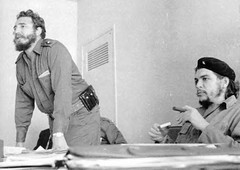
Fidel Castro and Che Guevara during the early days of the Cuban Revolution. The role of the intellectuals in Cuba was a major point of discussion during the early 1960s.
Originally uploaded by Pan-African News Wire File Photos
THE SHOOTDOWN OF MAJOR ANDERSON
New Book One Minute to Midnight Reveals U.S. Intelligence Tracked Activation of Soviet Air Defenses During Missile Crisis
For more information contact:
Michael Dobbs - dobbsm@washpost.com - 202/334-4399
http://www.nsarchive.org
Washington, DC, June 25, 2008 - American signals intelligence collectors tracked the activation of Soviet air defenses prior to the shootdown of a U.S. spy plane at the peak of the Cuban missile crisis, according to documents published on the Web today by the National Security Archive.
A new book by Washington Post reporter Michael Dobbs shows that the destruction of the U-2 piloted by Major Rudolf Anderson, Jr. on October 27, 1962, was closely connected to the deployment of Soviet nuclear cruise missiles in the vicinity of the U.S. naval base at Guantanamo. Soviet generals feared that the spy plane had uncovered the forward launch position of the cruise missiles, just 15 miles from Guantanamo.
This is the fourth of five postings looking at the new material in One Minute to Midnight: Kennedy, Khrushchev, and Castro on the Brink of Nuclear War, which draws on the National Security Archive's long-standing documentary work on the Cuban missile crisis. The book provides new details about U.S. SIGINT (signals intelligence) activities in and around Cuba at the height of the missile crisis.
Next week, in the final installment from One Minute to Midnight, the National Security Archive will publish key primary sources behind the "Eyeball to Eyeball" confrontation between U.S. and Soviet ships that never happened.
Visit the Web site of the National Security Archive for more information about today's posting.
http://www.nsarchive.org
____________________________________________________
THE NATIONAL SECURITY ARCHIVE is an independent non-governmental research institute and library located at The George Washington University in Washington, D.C. The Archive collects and publishes declassified documents acquired through the Freedom of Information Act (FOIA). A tax-exempt public charity, the Archive receives no U.S. government funding; its budget is supported by publication royalties and donations from foundations and individuals.
No comments:
Post a Comment